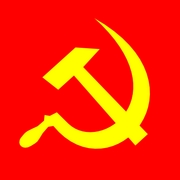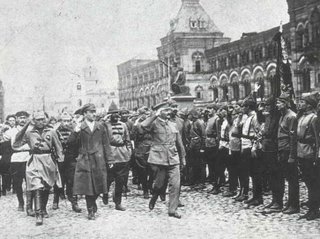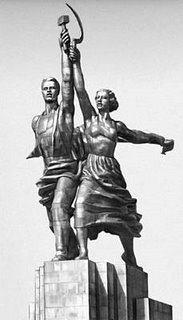 This week I will be in the city of Okayama, receiving instruction as part of the requirements for employment with Nova. As a result of this fact, I felt I would write a quick blog before I left as a way to maintain my consistency. Despite this, I must admit that the desire to remain constant in regards to my blog is not my primary reason for writing. As many of you are undoubtedly aware (or should be!), this Tuesday is the 89th anniversary of one of the most important events in world history. On November 7, 1917, a small political party chose to take power in a decision that set the course for many notable events that shaped the 20th century. In the next few paragraphs, I will focus on some of the causes of the revolution, as well as attempt to relate the effects of the Bolshevik party's leadership in revolutionary Russia. I also plan to briefly reveal how their beliefs and successes impacted our modern lives, as well as address the possibility that their philosophy may still have a hand in influencing our futures.
This week I will be in the city of Okayama, receiving instruction as part of the requirements for employment with Nova. As a result of this fact, I felt I would write a quick blog before I left as a way to maintain my consistency. Despite this, I must admit that the desire to remain constant in regards to my blog is not my primary reason for writing. As many of you are undoubtedly aware (or should be!), this Tuesday is the 89th anniversary of one of the most important events in world history. On November 7, 1917, a small political party chose to take power in a decision that set the course for many notable events that shaped the 20th century. In the next few paragraphs, I will focus on some of the causes of the revolution, as well as attempt to relate the effects of the Bolshevik party's leadership in revolutionary Russia. I also plan to briefly reveal how their beliefs and successes impacted our modern lives, as well as address the possibility that their philosophy may still have a hand in influencing our futures.The world was at war in 1917, and Russia had chosen to involve itself in the hope of receiving glory and riches. Unfortunately, poor leadership by Tsar Nicholas II coupled with harsh treatment by landowners and business leaders had created squalor and hardship throughout the countryside.
 The soldiers, the peasants, and members of the working class had long suffered under the yoke of people living decadent lifestyles at their expense, and the war only intensified the feelings of discontent. When the winter of 1916-17 resulted in yet another famine, the people rose up and forced the Tsar to abdicate. The power vacuum opened the door for hundreds of politicians and revolutionaries to return to the country after years of forced exile abroad. A Provisional Government composed of many who supported capitalism was initially created to the pleasure of many foreign governments and businessman. The result was a state lead by aristocrats who continued the war aims of the Tsar and businessman who viewed the revolution as a perfect opportunity for financial gain in the future. The common people saw the contradiction between the goals of the new government and their own dreams, and began to look to the small Bolshevik Party as the only hope for true change.
The soldiers, the peasants, and members of the working class had long suffered under the yoke of people living decadent lifestyles at their expense, and the war only intensified the feelings of discontent. When the winter of 1916-17 resulted in yet another famine, the people rose up and forced the Tsar to abdicate. The power vacuum opened the door for hundreds of politicians and revolutionaries to return to the country after years of forced exile abroad. A Provisional Government composed of many who supported capitalism was initially created to the pleasure of many foreign governments and businessman. The result was a state lead by aristocrats who continued the war aims of the Tsar and businessman who viewed the revolution as a perfect opportunity for financial gain in the future. The common people saw the contradiction between the goals of the new government and their own dreams, and began to look to the small Bolshevik Party as the only hope for true change.The Bolshevik Party had two major leaders that set the stage for what transpired in November. Vladimir Lenin had created the Bolshevik party in 1903. The party promoted the idea that capitalism only helped a small part of the population, and that the majority of people were being exploited for the gain of a vast minority. Lenin claimed that only socialism was capable of giving universal equality in the economic, political, and social realms.
 Lenin's argued that only hard work and fervent belief in a world revolution could create this change. His trust in the necessity of revolution as the only means for transforming Russia had fueled his thinking, and he was justifiably motivated to double his efforts after the Tsar's removal. He was joined in this endeavor by Leon Trotsky. Trotsky was a leading theoretician and revolutionary who joined the Bolsheviks shortly after returning to Russia in 1917. He was a master orator who skillfully utilized his words the fill the people with a sense of hope that had been squashed by the Provisional Government. Many of his theories would be utilized by the party, and his tireless work ethic allowed him to become one of the most prominent and admired leaders in Russia. The two revolutionaries were joined by a cadre of like minded individuals who had spent their lives working toward the goal of allowing the Russian people the opportunity to attain their true potential. The stage was set for the October Revolution (so called because the Russian {Julian} calendars listed the day as October 25th, while European and American {Gregorian} calendars listed it as November 7th).
Lenin's argued that only hard work and fervent belief in a world revolution could create this change. His trust in the necessity of revolution as the only means for transforming Russia had fueled his thinking, and he was justifiably motivated to double his efforts after the Tsar's removal. He was joined in this endeavor by Leon Trotsky. Trotsky was a leading theoretician and revolutionary who joined the Bolsheviks shortly after returning to Russia in 1917. He was a master orator who skillfully utilized his words the fill the people with a sense of hope that had been squashed by the Provisional Government. Many of his theories would be utilized by the party, and his tireless work ethic allowed him to become one of the most prominent and admired leaders in Russia. The two revolutionaries were joined by a cadre of like minded individuals who had spent their lives working toward the goal of allowing the Russian people the opportunity to attain their true potential. The stage was set for the October Revolution (so called because the Russian {Julian} calendars listed the day as October 25th, while European and American {Gregorian} calendars listed it as November 7th).One of the major platforms espoused by the Bolsheviks was the phrase "All Power to the Soviets".
 A "soviet" was a congress of common people chosen to represent their brethren. "Soviets" could be found in many major cities and were seen as more reliable than the Provisional Government because they could actually discuss issues directly relevant to the concerns of the majority of the population. The Bolshevik support of these congresses showed their belief in democracy as well as giving them the overwhelming support of many city dwellers (their support in the countryside was less). On November 7th, Bolshevik supporters lead by Trotsky, stormed the Winter Palace (the building where the Provisional Government met) and declared the formation of the first socialist country.
A "soviet" was a congress of common people chosen to represent their brethren. "Soviets" could be found in many major cities and were seen as more reliable than the Provisional Government because they could actually discuss issues directly relevant to the concerns of the majority of the population. The Bolshevik support of these congresses showed their belief in democracy as well as giving them the overwhelming support of many city dwellers (their support in the countryside was less). On November 7th, Bolshevik supporters lead by Trotsky, stormed the Winter Palace (the building where the Provisional Government met) and declared the formation of the first socialist country.What happened later is a story to long to relate in this forum. The high ideals and hope of the revolution descended into despair due to numerous unforeseen hardships. Foreign intervention (by Great Britain, U.S.A., and France) as well as Civil War resulted in bringing the Soviet Government to the brink of destruction. The death of Lenin from a stroke in 1924 and the rise of Joseph Stalin who subsequently proceeded to kill many of the brilliant leaders of the revolution, (including Trotsky in 1940) caused the Soviet Union to veer away from its original ideals.
 The corruption and lack of democracy that existed under Stalin's regime allowed for many of those who were threatened by the original ideas promoted by the revolution to conclude that true equality was nothing more than an unattainable delusion. Despite this, the Soviet Union's existence set the stage for the rest of the history of the 20th century. The U.S.S.R (Union of Soviet Socialist Republics) was one of the primary players in the allied victory in World War II and the resulting Cold War. The collapse of the Soviet Union in 1991 ended the corrupted dream of its creators. Many in the west hailed the end of the U.S.S.R. as the triumph for freedom and capitalism. It was this victory that cleared the way for the oppressed people living within the former Soviet Union to finally breathe the air of capitalism's freedom.
The corruption and lack of democracy that existed under Stalin's regime allowed for many of those who were threatened by the original ideas promoted by the revolution to conclude that true equality was nothing more than an unattainable delusion. Despite this, the Soviet Union's existence set the stage for the rest of the history of the 20th century. The U.S.S.R (Union of Soviet Socialist Republics) was one of the primary players in the allied victory in World War II and the resulting Cold War. The collapse of the Soviet Union in 1991 ended the corrupted dream of its creators. Many in the west hailed the end of the U.S.S.R. as the triumph for freedom and capitalism. It was this victory that cleared the way for the oppressed people living within the former Soviet Union to finally breathe the air of capitalism's freedom.The end of the Soviet Union was heralded by the rest of the world as fundamental proof of the ultimate correctness of capitalism, as well verification of the deficiencies inherent in socialism. While this argument is convenient to those who fear the implications of fully functioning socialist state, the question remains. Will socialism or something like it ever exist? To be sure, anyone with a passing knowledge of Marxism knows that the social and economic conditions he described as being ripe for socialism were non-existent in the countries where it was implemented (i.e. Russia, China, Cuba, North Korea, Vietnam, etc.).
 With this in mind, it is also important in my opinion to disregard some of the antiquated aspects of Marxism, and instead focus on the fundamentals, notably class struggle and dialectical materialism. By using these principles and extrapolating ideas based on the economic and social conditions of today, it is possible for numerous scenarios to emerge. In conclusion, I urge everyone to take my advice and become involved in the events that shape our world. Even if you don't accept all or any tenets of Marxism, the important thing is to use your intellect, and involve yourself in the continued improvement of our species. Marx once said that, "Philosophers have only interpreted the world, the point, however, is to change it." Regardless of the past and future faults of the Bolsheviks, it is important to note one thing. On November 7, 1917, they believed they were about to change the world and usher in a period of truth, justice, and total equality. I only hope that we can someday replicate that example and be successful. We just need to take that first step.
With this in mind, it is also important in my opinion to disregard some of the antiquated aspects of Marxism, and instead focus on the fundamentals, notably class struggle and dialectical materialism. By using these principles and extrapolating ideas based on the economic and social conditions of today, it is possible for numerous scenarios to emerge. In conclusion, I urge everyone to take my advice and become involved in the events that shape our world. Even if you don't accept all or any tenets of Marxism, the important thing is to use your intellect, and involve yourself in the continued improvement of our species. Marx once said that, "Philosophers have only interpreted the world, the point, however, is to change it." Regardless of the past and future faults of the Bolsheviks, it is important to note one thing. On November 7, 1917, they believed they were about to change the world and usher in a period of truth, justice, and total equality. I only hope that we can someday replicate that example and be successful. We just need to take that first step.
No comments:
Post a Comment